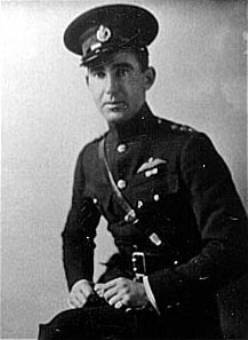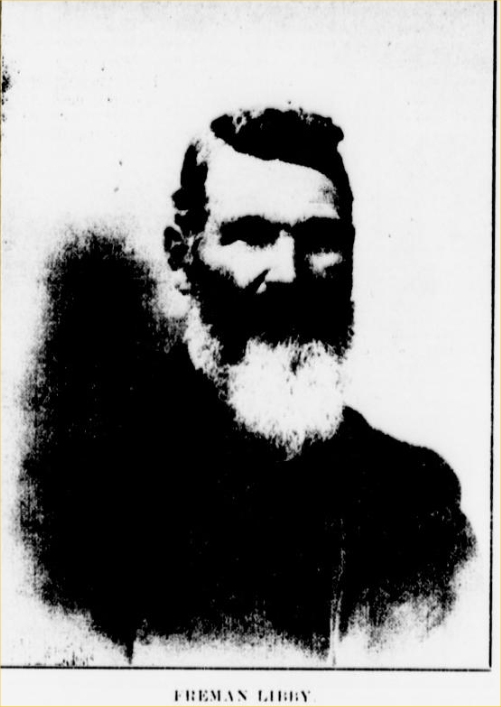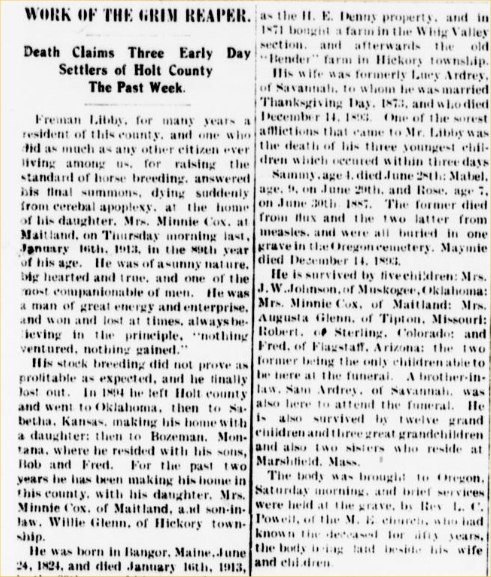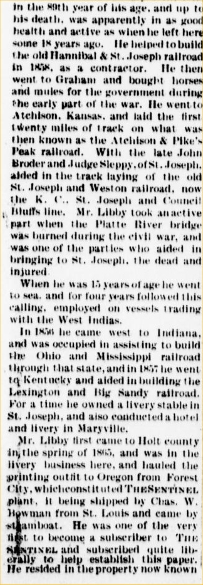In 1870 Andrew County, Missouri, Mary Ardery is 33, LUCY 15, John W. 12, Charles 9, Samuel 7, and Mary S. 5.
One tree said his mother Lucy Ardrey, born May 10, 1855 to William A. Ardery and Mary Whitehead, died Dec 12, 1893 in Oregon, Missouri. It also said that his sister Minney Ardrey Libby, born 1884, married Gilliam Cox in 1922, and died 1961.)
Freeman and Lucy Libby had Mabel Libby on January 15, 1886 in Holt County, Missouri.
Mabel, dying June 30, 1887, is buried in Oregon, Missouri # 133438394.
"It is with a heavy and sad heart that we chronicle the death of little Samuel Libby, the four year old son of Freeman Libby and wife, who died June 28, 1887 of flux. He was the pride of the noble father's heart, the comfort of the dear mother, and the merry playfellow of brother and sister. Although little Sam had been sick but a few days, yet no one thought that the end was so near. Silently, but surely, the reaper gathered in the precious grain. His loss will be keenly felt. The vacant chair at the table, the broken toys, the half-worn shoes, the little dresses, all bring vividly to our minds that our darling is gone, that our houehold pet has left us. How sweet the sympathy of friends at such a dark hour.
Ere the little son had been in his lone and silent grave one day, his little angel sister, Mabel, aged eighteen months, went to join the angels and be company for little Sam. Darling Mabel is gone. The sweet pratle is hushed. Her spirit has flown to the great beyond. She feared not the rolling of the dark waters of Jordan for on the other side she saw her Savior and the angels smiling to welcome the pale sufferer. How the heart-broken parents gathered around the little cradle of the patient little Mabel, watched their babe breathing her life away, but could do nothing to save their tender blossom.
At eleven o'clock in the still hour of the night, again, the Reaper, Death, stole into the silent chamber and took for his choice another one of the bereaved parent's little ones. This time it was Rose, the nine year old daughter who died June the thirtieth. By her kind affectionate disposition, Rose endeared herself to all who knew her. She loved her parents passionately. She ever soothed the childhood cares of her brothers and sisters. On earth, she always took a pride in taking care of little Sam and Mabel. Now she has gone to take care of them in heaven. Her presence always made the family circle bright. She was a favorite with her companions. Ever obedient and teachable, she was greatly beloved by her teacher and schoolmates. Oh, relentless Death! Who can describe thy work? It is hard for us to realize that our bright, laughing, rosy, loving Rose is gone. And yet we must submit. The remains of the three were followed by a large procession of sympathizing friends and laid to rest in the Oregon cemetery, there to await the final resurrection. Bereaved and heart-broken parents, you have an innumerable host of friends to sympathize for and weep with you. May the Great God who now has your little ones, sustain help and uphold you in this your sore distress."
1894 Oregon Missouri "Freeman Libby
has sold his farm four miles northeast
of this city.... While we regret to
learn to Mr. Libby will remove from us,
we wish him prosperity wherever he may
locate. We are informed that he
will settle in the west somewhere, where
he will have room to engage more largely
in the raising and breeding of fine
horses. .."
Ludy Ardrey Libby 1855-1893 is buried in Oregon, Missouri # 133438336.
1894 "Freeman Libby and his son, Robert, are in town, this week shaking hands with their numerous friends. They will return the latter part of the week with a car lad of horses that they had left here. They will take them to Limon, Col., where Robert has charge of a horse ranch for his father."
March 1897 Oregon, Missouri "A little son of Freeman Libby has recently gone to Craig in this county, where he will make his home with his uncle Sam Ardery." (James Samuel Ardrey, born 1863 in St. Joseph Missouri, married Izetta Parrish 1895 in Craig, Missouri, and died 1925 - horse breeder. In 1900 Samuel and Ettie Ardry are in Andrew County, Missouri.)
His mother died of tuberculosis when he was four years old, leaving him to be raised by his widower father, an older brother, and a live-in housekeeper. He attended local schools for his formal education, and began learning to ride at the age of six. One of his youthful feats was roping a pronghorn at the age of ten. (Arlene Glenn wrote that their ranch was near Summit Springs - south of Sterling.)
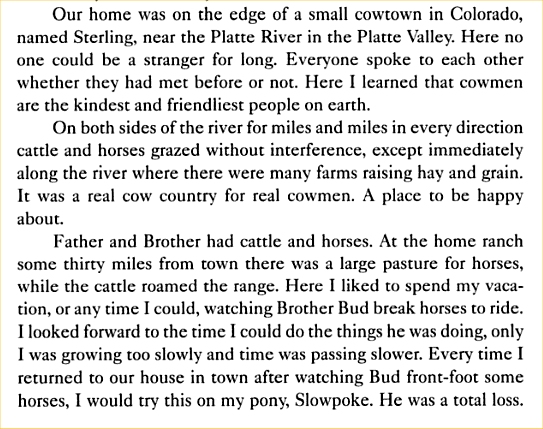
In the autumn of 1903, he moved to
Sabetha, Kansas to temporarily live
with his older sister Minnie.
(Minnie was born in May 1888, per the
1900 census of St. Joseph, Missouri -
she was living with uncle Charles Ardrey
)By 1904, Libby's father and elder
brother had re-established themselves as
horse brokers in Minco, Indian Territory ; one of their
clients was Buffalo Bill. Frederick Libby
rejoined them in 1904.
He then lived with his aunt in Marshfield, Massachusetts during the
school year to attend high school during
his fifteenth and sixteenth years.
(He must be the Fred Libby in 1910 Logan
County, Colorado - Leroy precinct - 20,
born in Missouri, father Maine, mother
Missouri, living alone, doing ranch
work) In 1910, Frederick Libby moved to
Phoenix, Arizona because of his
father's concern (which fortunately
proved to be unfounded) that his son
might have tuberculosis. The younger
Libby first worked for wages as a cowboy
while there.
June 1911 Sterling "Fred Libbey, who has been spending
the past eight months at and near Phoenix, Ariz.,
where he has been employed on a large ranch, returned to
Sterling last evening."
He then became an itinerant cowboy and mustanger.
Libby was in Calgary, Canada when the war began. He claimed to have joined the Canadian Army on 2 September 1914, although his enlistment papers are dated 5 January 1915 and signed in Toronto. He gave his occupation as chauffeur upon enlistment. His enlistment papers describe him as being 5' 8 1/2" (1.74 m) tall, with a medium complexion, brown hair, and gray eyes. He was assigned to motor transport duty in the Canadian Expeditionary Force's supply column. When the Americans in Canadian service were notified that they could be discharged to avoid loss of their citizenship, Libby stayed on.
Libby shipped out of Halifax Harbour , Nova Scotia for England on HMCS Metagama in April 1915. Upon arrival, his unit staged a short-lived mutiny because they had not been paid. After being paid, they were equipped with brand new trucks–a melange of Locomobiles, Packards, Pierce Arrows, Peerlesses, Leylands , and British Daimlers . They took their new trucks to Rouen , France to begin their assignment supporting the Canadian 2nd Division
After serving in this motor transport unit through the winter of 1915–1916, he volunteered to join the Royal Flying Corps , becoming an observer in an F.E.2b in 23 Squadron.
before joining the Canadian Army when the First World War broke out. He became a medical orderly and was soon on active service in France. By spring 1916 he had seen enough of the trenches, and volunteered to become an observer in the Royal Flying Corps.
Libby joined No.23 Squadron, flying F.E.2bs out of RFC Le Hameau. On his first operation, on 15 July, 1916, he shot down an Ago CII. In August he was transferred to No.11 Squadron, and between 22 and 25 August he shot down a further four enemy aircraft, making him America's first ace. In November 1916, with his score at ten enemy aircraft and the award of the Military Cross, he was sent back to the UK for pilot training.
Capt. Libby was decorated with the British military cross at Buckingham Palace by King George on December 13, 1916.
In April 1917 Libby returned to France, joining No.43 Squadron flying Sopwith 1 1/2 Strutters. In July he was promoted to Captain and appointed a Flight Commander, and made two further claims. In August he was transferred again, to No.25 Squadron flying De Havilland D.H.4 bombers. He made two further claims with this unit, before being transferred to the US Air Service in September 1917. Sent back to America, he fell ill and was discharged. He suffered from permanent spinal problems until his death in 1970.
The marriage record of El Paso from May 11, 1919 says Frederick was born July 15, 1892 in Sterling, and married Caroline M. Stein, born May 25, 1892 in Silver City, New Mexico
Libby had at least 14 and maybe as many as 24 victories. He was arguably America's first ace, although as he was an observer at the time and not a pilot, there is some debate over whether he qualifies for this title or not.
Frederick's July 1920 passport application said that his father was Freeman Libby, born in Bangor, Maine, deceased.
He's buried in Los Angeles National Cemetery - 3727972
From breaking wild horses in Colorado to fighting the Red Baron's squadrons in the skies over France, here in his own words is the true story of a forgotten American hero: the cowboy who became our first ace and the first pilot to fly the American colors over enemy lines. Growing up on a ranch in Sterling, Colorado, Frederick Libby mastered the cowboy arts of roping, punching cattle, and taming horses. As a young man he exercised his skills in the mountains and on the ranges of Arizona and New Mexico as well as the Colorado prairie. When World War I broke out, he found himself in Calgary, Alberta, and joined the Canadian army. In France, he transferred to the Royal Flying Corps as an "observer," the gunner in a two-person biplane. Libby shot down an enemy plane on his first day in battle over the Somme, which was also the first day he flew in a plane or fired a machine gun. He went on to become a pilot. He fought against the legendary German aces Oswald Boelcke and Manfred von Richthofen, and became the first American to down five enemy planes. He won the Military Cross for conspicuous gallantry in action. Libby's memoir of his cowboy days in the last years of the Old West evokes a real-life Cormac McCarthy novel. His description of World War I combines a rattling good account of the air war over France with captivating and sometimes poignant depictions of wartime London, the sorrow for friends lost in combat, and the courage and camaraderie of the Royal Flying Corps. Told in charming, straightforward vernacular, Horses Don't Fly is an unforgettable piece of Americana. |
----------------------------------------------------
Freeman Libby married Cornelia Elizabeth Tobin July 27, 1857 in Shelby County, Missouri.
Col. Libby sold Jacob Rayhill of New Point, Holt County, Missouri, a mare mule "Bett" in 1866, and she was still alive in 1893, per the Sentinel.
In 1870 Holt County "Frank" 41 and Cornelia 33 have Mary 11, Emma and Cordelia 8.
Freeman Libby and Lucy Ardray married November 28, 1872 - Oregon Missouri newspaper of September 24, 1897.
January 10, 1886 Mabel Libby was born in Holt County to Freeman Libby and Lucy Ardin Libby.
Col Freeman T. Libby, born Aug 4, 1824 in Maine, dying Jan 16, 1913 in Holt County, Missouri, buried in Maple Grove Cemetery, Holt County. Informant was E.H. Waller of Maitland, Missouri.
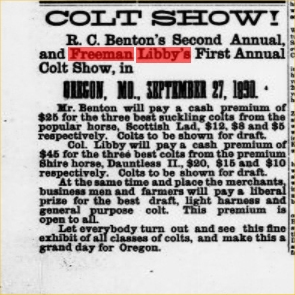
July 26, 1889 Holt County "Freeman Libby is the proudest man on earth - it's a fine bouncing boy."
In 1892 Freeman Libby, of Sterling, Colorado, filed on the northeast quarter of 23, 9N 8W, Grady County, Oklahoma. When it was issued in 1904 he was "of Caddo County, Oklahoma."
April 1893 Holt County
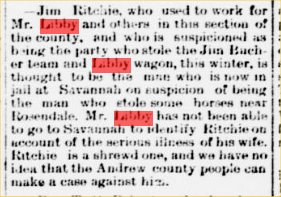
June 1893 Holt County "F. Libby left last Monday for Columbus, Kan., and while absent, will probably take a trip through the Cherokee strip."
October 1893 "F. Libby returned Saturday from a prospecting tour through Colorado. He says he made his trip just one month too late to be of any benefit to him, as the winter had set in in many localities in that state."
December 1, 1893 "Seven Brothers" were repainting F. Libby's carriages and carts in Oregon, Missouri.
December 22, 1893 Holt County Sentinel
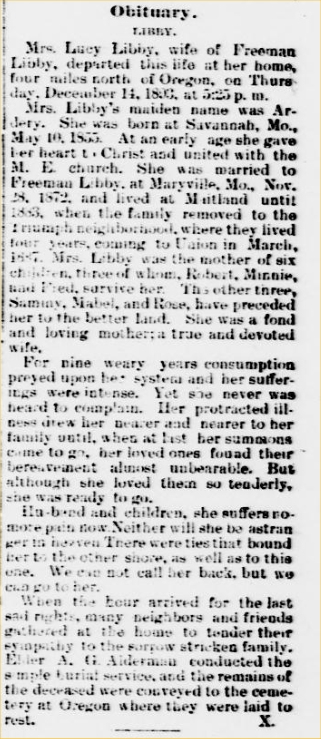
1894 Oregon, Missouri "Col. Freeman Libby shipped his horses to his new home, Columbus, Cherokee County, Kansas , this week, and will leave with his family some time this week.......Robert Libby, accompanied by Charles Parsons, left last Wednesday with his father's horses for their new home in Columbus, Cherokee County, Kansas. Charley will take a prospecting trip through the Indian Nation before he returns."
1897 Oregon, Missouri "Our old friend, Col. Freeman Libby, formerly of this county, but for several years a resident of Limon Colorado, was in Craig last week with a car load of driving and work horses. We did not learn the result, but hope he did a good business."
1905 Oregon, Missouri "George Landrey, who recently returned from a trip through the Indian Territory, reports meting (sic) a former well-known citizen of this county, Freeman Libby, who now lives four miles south of morris (sic) , I.T. Mr. Landrey says that Mr. Libby has the patent for an apple picker, that will prove a success. We hope that he can and will make a fortune out of his patent, for if any man deserves success it is Freeman."
1906 "Colonel Freeman Libby is reported to be alarmingly ill at West Plains, Mo., without means and among strangers."
June 1909 Oregon, Missouri "Freeman Glenn, who is clerking in one of the large stores at California, Missouri, has been visiting the past week with his father, brothers and sisters, and also with his grandpa Freeman Libby, who was also here on a visit."(Freeman was the son of Wellington Glenn and Augusta Libby.)
Wellington 23, and Augusta 18 are in Holt County in 1880, farming.
They are separated by 1900, and Augusta is buried in the same cemetery as Robert Libby andtheir sister in St Joseph, Missouri 1861-1941 # 47513230.
She had been in St Joseph for eight years, informant Mrs. Minnie L. Kneale of St. Joseph, who didn't know her mother or the location of G. W. Glenn.)
February 1910 "Freeman Libby left Monday for Pineville, Alabama, where he will go in hiding from Missouri's March winds."
The "older brother" might be the Robert H. Libby in 1880 Holt County, 4, born in Missouri, with father Freeman Libby 50 born in Maine, Lucy 24 born in Missouri, and Rosanna, 1, born in Missouri.
Robert is in 1900 Sterling, born in Missouri February 1875, a horse dealer lodging with the widow Mary Hutts.
December 1900 Oregon, Missouri "It was of no little pleasure that we were permitted to greet Robert Libby of Sterling, COlorado, who is here on a visit with his many old friends. He tells us that his father, Freeman Libby, although 72 years of age, is enjoying the very best of health. He tells us that they are all reasonably prosperous, and their many friends will be delighted at this bit of news."
In 1910 he's in Eureka County, Nevada, still single, a horse broker, in a boarding house. In 1920 Colfax County, New Mexico he's a livestock broker, 45, married to Louise, 36, born in Indiana, a milliner with her own shop.
|
1908 Holt County, Missouri "Freeman Libby, for many years a resident of this county, and one who did perhaps as much as any other citizen ever living among us for raising the standard of horse breeding in our county, was back among us again, visiting with old friends, and all seemed glad indeed to greet him again. He Beamed the same genial and companionable old gentleman as ever. He was a man of great energy and enterprise, and won and lost at times, always believing in the principle "nothing ventured, nothing gained He was born in Bangor, Maine, June 24, 1828, and is therefore just beginning on his 81st year, hale and hearty, and seemingly as active as when be left this county, in the early spring of 1891. He ......Platte county railroad, from Weston to Savannah. He then went to Graham and bought horses and mules for the government during the early part of the war. He went to Atchison, Kansas, and laid the first twenty miles of track on what was then known as the Atchison & Pike's Peak railroad. When he was 15 years of age he went to sea, and for four years followed this calling, employed on vessels trading with the West Indies. Mr. Libby first came to Holt county in the spring of 1865, and was in the livery business here, and hauled the printing outfit to Oregon, from Forest City, which constituted The Sentinel plant, it being shipped by Chas. W. Bowman from St. Louis and came by steamboat. He was one of the very first to become a subscriber to The Sentinel and subscribed quite liberally to help establish this paper. He resided in the property now occupied by H. E. Denny. In 1871 he bought a farm in the Whig Valley section, and afterwards the old Bender farm in Hickory township. His stock breeding did not prove as profitable as expected, and he finally lost out. In 1894 he went to the Oklahoma country, and at present is making his home with his daughter, Minnie, at Sabetha, Kansas, but on his return expects to go to Bozeman, Montana. His sons, Bob and Fred, are dealing in stock at Sterling, Colorado. His wife was formerly Lucy Ardrey, of Savannah, Mo., who died December 14, 1893. In politics be was always an intense Republican. He has always been a man of wonderful adaptability for any kind of business, and before the mast, as a railroad contractor, hotel proprietor, livery man and farmer, he was reasonably successful, but his extensive engagement in horse breeding, brought about reverses, caused by declines in values, caused his former successes to become a reversal. " From the Sterling Journal Advocate - January 10, 2011 - excerpts from "Horses Don't Fly" So, who was Frederick Libby? Frederick was born on a ranch in the Sterling area in 1892. When he was 4 years old, his world turned upside down with the death of his mother. He continued to live on the ranch with his father, Freeman Libby, and his older brother, Bud, whom he worshipped. Bud, who was many years older, always had to rescue Frederick when the little boy got into trouble, which was often. Sometimes you will find yourself chuckling and often laughing aloud as you hear the stories told by the storytellers. Ever hear about boys tipping over outhouses at Halloween? Well Fred and the King boys did that too and that story has a surprise ending you will like. Young Fred always had one dream -- to be a cowboy. Brother Bud broke horses on the ranch and Fred was always tagging at his heels trying to learn the best techniques. He also had a way of getting into trouble in this endeavor. One Sunday, he was dressed for church and told to "stay clean." Out of the window he saw an antelope grazing on the lawn and his mind immediately went into overdrive as to how he could rope that antelope. He was successful, but what a price he paid! Fred hung out with the King boys of the King Ranch nearby who were his allies in wanting to be cowboys. The things those boys did! The three of them wanted nothing to do with wearing "sissy" clothes which meant the current style for young boys -- knee pants and nice shirts or sweaters. If Fred couldn't wear his cowboy clothes, he didn't attend the occasion, including school in Sterling. Fred became an excellent horseman and used what was probably an early "horse whisperer" method that worked well for him. He roped and broke horses all over the country, including many mustangs here in the Sterling area. It looked like his future was to stay in Sterling and live on the family ranch. Then when he was 16, another event changed his plans. He was to live in a line camp and care for 4,000 head of cattle during the winter all by himself. Supplies were hauled out to him and he never saw another human for six months. And what a winter it was! Those of you who remember the winter of '49 may have a little idea what young Fred must have lived through as the dead cattle piled up around his door. Right then, Tahiti began to sound good! Fred left Sterling about that time and, after cowboying in warmer New Mexico and Arizona, turned up in Canada needing a job. A recruiter for the Canadian Army Air Corps approached him about joining up as Canada was fighting in World War I and the U.S. hadn't entered the war yet. What did a cowboy know about an aircraft? He knew nothing, but he learned fast and loved flying and for the first time in his life, he had found something better than horses. This led him to name his autobiography "Horses Don't Fly."
|
1909 Oregon, Missouri - a "homecoming" mentioned Freeman Libby of Sabetha, Kansas.
